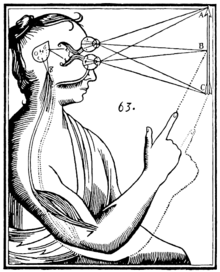
Back مثنوية Arabic مثنويه ARZ Dualismu AST Dualizm Azerbaijani Дуализъм (религия) Bulgarian Dualisme Catalan Dualismus (filozofie) Czech Дуализм (философи) CV Deuoliaeth Welsh Dualisme Danish

Dualism is the idea or theory that something (an object, an idea, or the whole world) is split into two parts. The parts are separate from each other, and the thing cannot be divided up in any other way.
That contrasts with the idea or theory that something cannot be split into any parts, which is called monism, and with the idea or theory that something can be split into many parts, which is called pluralism.
In philosophy, there are many kinds of dualism.
- In the philosophy of mind dualism means that the mind and the body are two very different things.[1] Nothing that is part of the body can be part of the mind, and nothing that is part of the mind can be part of the body. People like that sort of dualism because they think that the mind is too important or too strange to be part of the body. A contrasting idea is that the mind and the body are the same thing or that mind is just another word for the brain. (See also René Descartes.)
- In epistemology, dualism means that there is a barrier between a person and the world around them. The barrier splits the world into two for that person, into "myself" and "the world." Each person can see, hear, taste, smell and touch the world but cannot know it directly. For example, somebody cannot know just by looking that things are made up of many atoms. This means that something could happen in the world that we would not know about because we could not see, hear, taste, smell or touch it. A non-dualist idea is that a person is just another part of the world and that there is no barrier. For example, it could be said that if we cannot see, hear, taste, touch or smell something, it does not affect us.
Dualism is also a common sense idea. For example, it is a form of dualism to say that a thing is hot or cold, good or bad, mine or somebody else's. That has no allowance for possible states in between.
- ↑ Mandik, Pete (2014). This is Philosophy of Mind: An Introduction. Wiley-Blackwell.